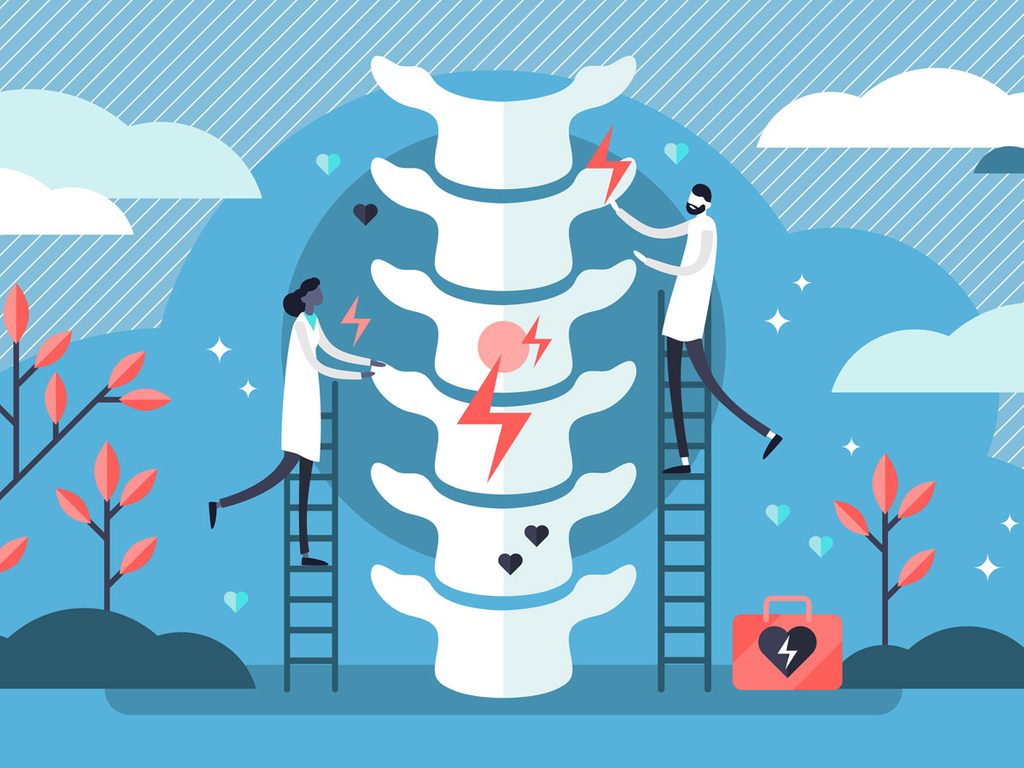What Happens to Your Body When You Crack Your Back

The occasional "crack" of your back is fine, but doing it all the time, on purpose, may not be such a great idea.
Whether you do it on purpose or by accident, you can “crack” your back the same way you crack your knuckles—and that doesn’t mean you’re fracturing or cracking bones or cartilage. The sound indicates the shifting of spinal joints, says Chris Vargas, a doctor of chiropractic in Pasadena, California. “That cracking sound that people hear is the release of gas bubbles within the spinal joints,” he says. When your spine is out of alignment, the joints can swell and fill with bubbles that may pop when you move certain ways, according to Vargas.
These gas pockets of nitrogen, oxygen, and carbon dioxide in the joint fluid reaccumulate over time, which is why we can’t usually crack the same joint several times in a row, according to Joshua Scott, MD, primary care sports medicine physician at Cedars-Sinai Kerlan-Jobe Institute in Los Angeles. The back tends to crack after you’ve been stuck in the same position for a long time—especially if you’re hunched or slumped, Vargas adds. For example, he notes, after you’ve been sitting at a desk all day, your back may pop as you straighten, bend, or move about and your spine shifts back into its normal alignment. (Wondering what type of back pain you have? Here’s how to tell.)
Although back cracking can be a happy accident, some people do it intentionally, Vargas explains. Typically, they do it to relieve discomfort caused by misalignment, he says.
Despite how good it may feel to crack your back, most experts agree that doing it frequently isn’t worth the temporary relief: Habitual back crackers could end up with chronic back pain from damaged discs and nerves; the repeated twisting may cause excessive wear on your spinal joints, experts say. The primary concern is that popping your back may not address the root of your spinal issues—especially since you could be manipulating the wrong joints, warns William Charschan, a doctor of chiropractic and Certified Chiropractic Sports Physician who has offices in North Brunswick and Scotch Plains, NJ.
Many people who crack their backs daily actually have spinal subluxation—their vertebrae are misaligned, says Vargas. Cracking your back only moves the joints that are compensating for the subluxation. “So over time, they will make the primary problem worse, or they will wear down the compensating joints,” he says.
Although routine back cracking could do more harm than good, the occasional pop—like the once you might experience after a long day of sitting—is no cause for concern. “If you are moving your spine through normal ranges of motion without the use of any additional force, and you happen to hear that cracking sound, this is considered safe,” Vargas says. “Outside of that, any introduction of force to a spinal joint should be performed by a chiropractor.” Don’t be afraid to try these home back pain remedies—they’re backed by science.
Dr. Scott notes that people who crack their backs once in a while are unlikely to hurt themselves: Your body naturally limits your movements to protect the spinal cord. However, repetitive and habitual back cracking can stretch the ligaments around the spine, allowing excessive movement, joint instability, and an unstable body, says Dr. Scott.
Next, check out these back stretches that can help prevent injury.




